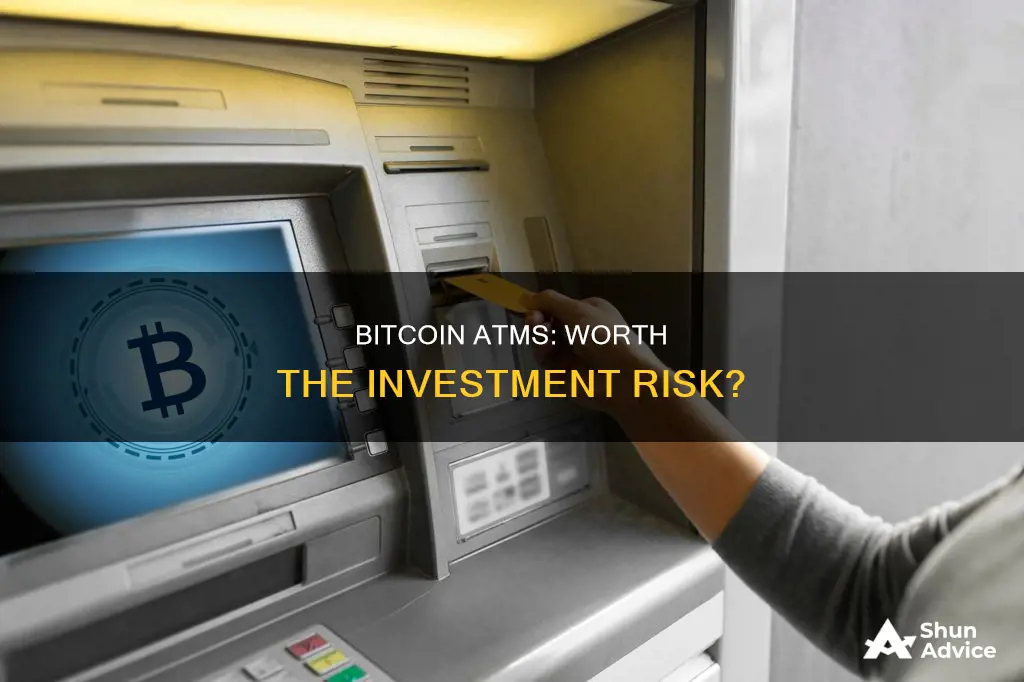
Bitcoin ATMs, also known as BTMs, are physical kiosks that allow users to buy and sell Bitcoin and other cryptocurrencies with cash. They serve as a bridge between the digital and traditional financial worlds, providing a tangible touchpoint for interacting with digital assets. With the growing popularity of cryptocurrencies, the demand for Bitcoin ATMs has also increased. As a result, starting a Bitcoin ATM business has become an attractive entrepreneurial opportunity.
In this discussion, we will explore the potential of Bitcoin ATMs as an investment option. We will delve into the benefits, risks, and profitability of owning and operating these machines. By examining various factors such as location, transaction volume, fees, and regulatory compliance, we will provide insights into whether investing in Bitcoin ATMs can be a profitable venture.
| Characteristics | Values |
|---|---|
| Description | A standalone machine that allows users to buy and sell Bitcoin and other cryptocurrencies in exchange for cash |
| Current Number of Bitcoin ATMs | Approximately 31,000-35,000 Bitcoin ATMs worldwide |
| Types of Bitcoin ATMs | Unidirectional (only allow cryptocurrency purchases) and bidirectional (allow both purchases and sales of cryptocurrencies) |
| Revenue | Revenue is generated through transaction fees, typically around 5-10% of each transaction |
| Competition | Low competition compared to traditional ATMs |
| Investment Costs | Initial investment can range from $10,000 to $50,000 per machine, including purchase, installation, and operational expenses |
| Maintenance Costs | Standard ATM repair costs average $150 per month, but prices may be higher for Bitcoin ATMs due to a limited supply of technicians |
| Location | High-traffic areas such as shopping centres, cafes, or transport hubs are ideal |
| Regulatory Compliance | Must comply with anti-money laundering provisions and register with relevant authorities |
| Consumer Demand | Consumer demand for Bitcoin ATMs is increasing as Bitcoin and cryptocurrency adoption rises |
| Profitability | Bitcoin ATMs have the potential to be profitable, with estimates of up to $3,000 in monthly earnings per machine |
What You'll Learn

Bitcoin ATM business opportunities
Bitcoin ATMs, also known as BTMs, are kiosks that allow users to buy and, in some cases, sell Bitcoin and other cryptocurrencies using cash or a debit card. They serve as a physical gateway to the world of digital currency, bridging the gap between digital and traditional finance. As the demand for cryptocurrencies like Bitcoin continues to grow, so does the demand for Bitcoin ATMs. This presents a unique and lucrative business opportunity for entrepreneurs.
Key Considerations:
- Regulatory Landscape: Understanding and complying with local laws, Anti-Money Laundering (AML), and Know Your Customer (KYC) regulations are critical.
- Location: Choose high-foot traffic areas like shopping centres, cafes, or transport hubs, and consider the demographics and existing competition.
- Machine Selection: Decide between one-way (cryptocurrency purchase only) and two-way (purchase and sale) machines, considering cost, functionality, and adaptability to new currencies and technologies.
- Licensing and Partnerships: Obtain necessary licenses and build relationships with local businesses and financial institutions for regulatory support and enhanced credibility.
- Revenue Streams and Costs: Understand revenue streams, such as transaction fees, and consider costs like machine purchase, installation, maintenance, and compliance.
- Security and Compliance: Implement robust security measures to protect against theft, fraud, and technical breaches, and ensure compliance with regulatory changes.
- Marketing and Customer Support: Develop a marketing strategy and provide educational resources to customers, along with reliable customer support.
Benefits of a Bitcoin ATM Business:
- Low Competition: With fewer Bitcoin ATMs compared to traditional ATMs, there is less competition, allowing for greater pricing flexibility and service differentiation.
- High Returns: Bitcoin ATMs can yield high returns, especially in areas with high demand and foot traffic.
- Passive Income: After installation, Bitcoin ATMs require minimal day-to-day management, allowing time for other priorities.
- Increased Foot Traffic: A Bitcoin ATM can attract new customers and drive foot traffic to existing businesses, benefiting store owners.
Challenges and Risks:
- Market Volatility: The cryptocurrency market is volatile, and regulatory changes, technical challenges, and market fluctuations can impact operations.
- High Transaction Fees: Bitcoin ATMs often charge high transaction fees, which may deter customers.
- Scams and Fraud: Bitcoin ATMs can be targeted by scammers and fraudsters due to their anonymous and accessible nature.
- Lack of Protection: Bitcoin is not federally regulated, and funds obtained through Bitcoin ATMs are not insured by the FDIC.
Starting a Bitcoin ATM business requires careful planning, understanding of the regulatory landscape, and effective operational management. While there are challenges, the potential for high returns and low competition makes it an attractive opportunity for entrepreneurs. With the growing demand for cryptocurrencies, Bitcoin ATMs present a unique business venture in the evolving financial landscape.
Small Bitcoin Investments: Worth the Risk?
You may want to see also

Bitcoin ATM transaction fees
The high fees associated with Bitcoin ATMs are a result of the extensive operational costs incurred by the ATM operators. These costs include regulatory compliance, staff training, cash logistics services, internet connectivity, insurance, leasing space for the ATMs, marketing, customer support, and machine maintenance.
It is worth noting that the fees at Bitcoin ATMs are separate from the network fees incurred when transferring Bitcoin from one wallet to another, which are typically much lower.
When it comes to generating revenue, Bitcoin ATM businesses can benefit from transaction fees, which can bring in substantial income. The revenue potential of a Bitcoin ATM depends on several factors, including the location, the number of daily transactions, the average transaction size, and the effectiveness of marketing strategies.
Overall, while the fees may seem high, they are necessary to cover the various costs associated with operating Bitcoin ATMs and ensuring secure and legitimate transactions.
Strategic Bitcoin Investment: A Smart Guide
You may want to see also

Bitcoin ATM privacy
Bitcoin ATMs, or BTMs, have been hailed as a convenient and accessible gateway to the world of cryptocurrencies, allowing users to buy and sell Bitcoin and other digital currencies with ease. However, when it comes to privacy, there are some important considerations to keep in mind.
Anonymity and Privacy
Bitcoin ATMs are often associated with anonymity due to their cash-based transactions and the lack of traditional KYC (Know Your Customer) requirements. Unlike traditional fiat ATMs, some Bitcoin ATMs allow users to withdraw bitcoins directly or convert them into fiat currencies without the need for a bank account or credit card. This feature makes Bitcoin ATMs a popular choice for those seeking to protect their identity and privacy.
However, it is important to note that Bitcoin transactions themselves are not completely anonymous. While the blockchain, the public ledger that records all Bitcoin transactions, does not store users' identities, it does log the transaction details, including the addresses of the sender and recipient. This means that while the transactions are conducted anonymously, they can still be traced back to the users' Bitcoin addresses.
Compliance and Regulations
Despite the perceived anonymity, Bitcoin ATM operators must adhere to regulatory compliance and privacy standards, especially in regions with stringent data protection laws. For example, Anti-Money Laundering (AML) and Know Your Customer (KYC) regulations are critical factors to consider. This may involve implementing systems to verify customer identities, especially for large transactions.
Privacy Concerns and Solutions
While Bitcoin ATMs offer a degree of privacy, there are some concerns worth addressing. Firstly, the number of Bitcoin ATMs worldwide is still relatively low, making it challenging to find one nearby. Additionally, some ATMs may require users to scan their ID documents or provide a phone number for KYC purposes, especially for purchasing large amounts of Bitcoin.
To enhance privacy, users can explore alternative methods such as peer-to-peer marketplaces or meeting sellers in person to buy Bitcoin anonymously. Prepaid credit or debit cards can also be used to purchase Bitcoin without linking it to their identity. However, these methods may come with higher transaction fees and a higher risk of scams.
Furthermore, for those seeking complete anonymity, more advanced solutions like Tor, VPNs, disk encryption software, and operating systems like Tails that prioritize privacy can be employed. These tools help disguise IP addresses, encrypt sensitive information, and ensure no traces of online activity are left on the device.
In conclusion, while Bitcoin ATMs offer a level of privacy and anonymity, they are not without their limitations. Users seeking to maximize their privacy should combine the use of Bitcoin ATMs with other privacy-enhancing tools and practices to ensure their transactions are as secure and anonymous as possible.
Grayscale Bitcoin Trust: A Secure Investment Option
You may want to see also

Bitcoin ATM pros and cons
Bitcoin ATMs, or BTMs, are physical kiosks that allow users to buy and, in some cases, sell Bitcoin and other cryptocurrencies in exchange for cash. They serve as a bridge between the digital and traditional financial worlds, making cryptocurrencies more accessible to the general public. While BTMs have grown in popularity, it is essential to weigh their advantages and disadvantages before investing in them.
Pros:
- Accessibility and Ease of Use: BTMs are widely available and easy to use, requiring only a photo ID, an eWallet QR code, and cash. This simplicity makes them more approachable than online exchanges, which can be complex and time-consuming.
- Fast and Secure Transactions: Unlike online exchanges, which can take up to a week for funds to appear, BTMs offer immediate transactions. They also provide enhanced security by verifying users' identities and not storing any scanned documents, reducing the risk of data breaches.
- Control and Trust: BTMs give users more control over their transactions than online exchanges, where buyers and sellers are randomly paired. Users know they are dealing with a reputable company, reducing security concerns and stress.
- Perfect for Travellers: Bitcoin ATMs are ideal for travellers who want to avoid exchange rates, conversion fees, and foreign transaction charges. They can easily access their crypto funds through BTMs, making it a convenient option when travelling within the US and Canada.
Cons:
- Transaction Fees: One of the significant drawbacks of BTMs is the high transaction fees, ranging from 5% to 20% per transaction, which is significantly higher than most online exchange platforms.
- Limited Availability: While BTMs are becoming more common, they are still harder to locate than traditional ATMs. Additionally, some BTMs may not be reputable or compatible with all eWallets, requiring users to seek out specific providers.
- Errors and Shutdowns: Like traditional ATMs, BTMs can experience occasional errors and shutdowns, which can be frustrating for users.
- Limited Cryptocurrency Options: Most BTMs only support Bitcoin, with only rare instances of other cryptocurrencies being available. This limits users' options and flexibility in their transactions.
Overall, while Bitcoin ATMs offer benefits such as accessibility and fast transactions, they also come with drawbacks, including high fees and limited availability. It is essential to carefully consider these pros and cons before investing in or relying solely on Bitcoin ATMs for cryptocurrency transactions.
Bitcoin Investment Returns: How Much Can You Make?
You may want to see also

Bitcoin ATM security
Bitcoin ATMs (BTMs) are a physical gateway to the world of digital currency, offering a familiar interface for users to interact with cryptocurrencies. As the demand for Bitcoin and other cryptocurrencies continues to grow, the need for secure and accessible means to transact is also increasing.
BTMs have evolved significantly since their inception, and today's machines offer robust security protocols and advanced security measures to protect transactions. Here are some key considerations regarding the security of Bitcoin ATMs:
Robust Security Measures:
BTMs employ advanced security protocols to safeguard transactions. These protocols ensure that user data and assets are protected during the entire transaction process. This includes encryption technologies, multi-signature requirements, and secure blockchain-based transactions.
Compliance with Privacy Standards:
In regions with stringent data protection laws, BTMs must adhere to strict privacy standards. This means that user data is kept confidential and secure, and operators must implement measures to protect user privacy.
Stable Internet Connection:
BTMs require a stable internet connection to access the blockchain and process transactions securely. A reliable connection ensures that transactions are executed promptly and reduces the risk of technical breaches or interruptions.
Physical Security:
The security of the BTM machine itself is crucial. Operators should implement measures such as secure locations, surveillance systems, and physical security protocols to prevent theft, vandalism, or unauthorized access to the machine.
Cybersecurity Measures:
As BTMs are connected to the internet, cybersecurity measures are essential to protect user data and transactions. This includes implementing firewalls, regularly updating security software, and monitoring for potential cyber threats.
Regulatory Compliance:
Operators must comply with local laws and regulations, including Anti-Money Laundering (AML) and Know Your Customer (KYC) regulations. This involves implementing systems to verify customer identities, report large transactions, and adhere to financial regulations to prevent fraud.
Professional Installation and Maintenance:
Professional installation and regular maintenance of BTMs are vital for optimal security. Operators should ensure that machines are professionally installed and regularly maintained to identify and address any potential security vulnerabilities.
Secure User Authentication:
BTMs should employ secure user authentication methods, such as two-factor authentication, biometric identification, or cryptographic keys, to ensure that only authorized users can access their accounts and perform transactions.
Fraud Prevention:
Operators should implement measures to detect and prevent fraudulent activities, such as transaction monitoring, anomaly detection systems, and user education on security best practices.
Data Backup and Disaster Recovery:
In the event of a security breach or system failure, having a robust data backup and disaster recovery plan is crucial. Operators should ensure that user data and transaction records are securely backed up and that systems can be quickly restored in case of an incident.
Security Awareness and Training:
Operators and users should stay informed about emerging security threats and best practices. Providing security awareness training can help users identify potential risks and take the necessary precautions to protect their assets.
In summary, the security of Bitcoin ATMs is a critical aspect of their operation. By implementing robust security measures, complying with regulations, and staying vigilant against evolving threats, operators can ensure the protection of user assets and data, fostering trust and confidence in the use of BTMs.
Strategic Company Investments with Bitcoin
You may want to see also
Frequently asked questions
A Bitcoin ATM is a standalone machine that allows users to buy and, in some cases, sell Bitcoin and other cryptocurrencies using cash or a debit card.
To use a Bitcoin ATM, a customer inserts cash or a debit card into the machine and uses the current market rate to exchange their traditional currency for Bitcoin. The Bitcoin is then sent to their digital wallet.
Bitcoin ATMs are easy to access and do not require users to have a bank account. They also offer more privacy than a centralized exchange as they often don't require users to share their personal information.
Bitcoin ATMs charge high transaction fees, have set transaction limits, and are a frequent target for scams and fraud.
Starting a Bitcoin ATM business requires strategic planning and understanding the regulatory landscape and compliance requirements. You will also need to consider the costs of purchasing, installing, and maintaining the machines, as well as the potential revenue streams and risks involved.







